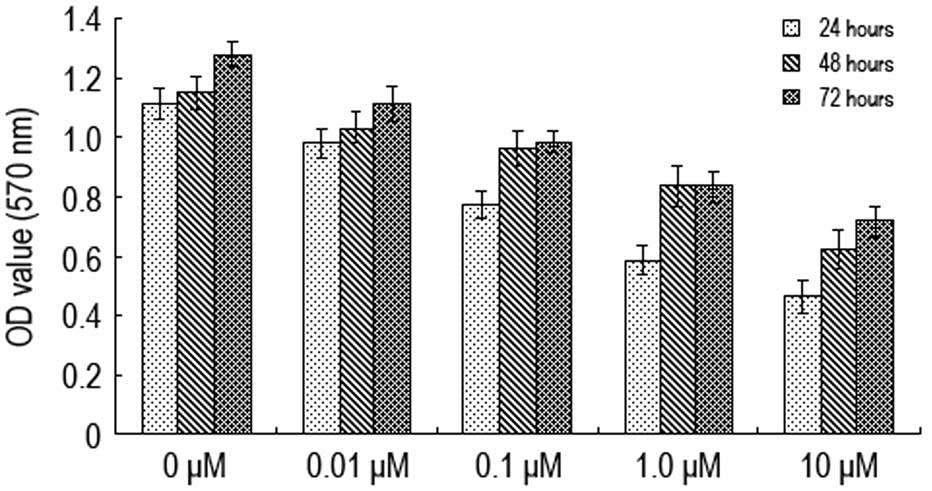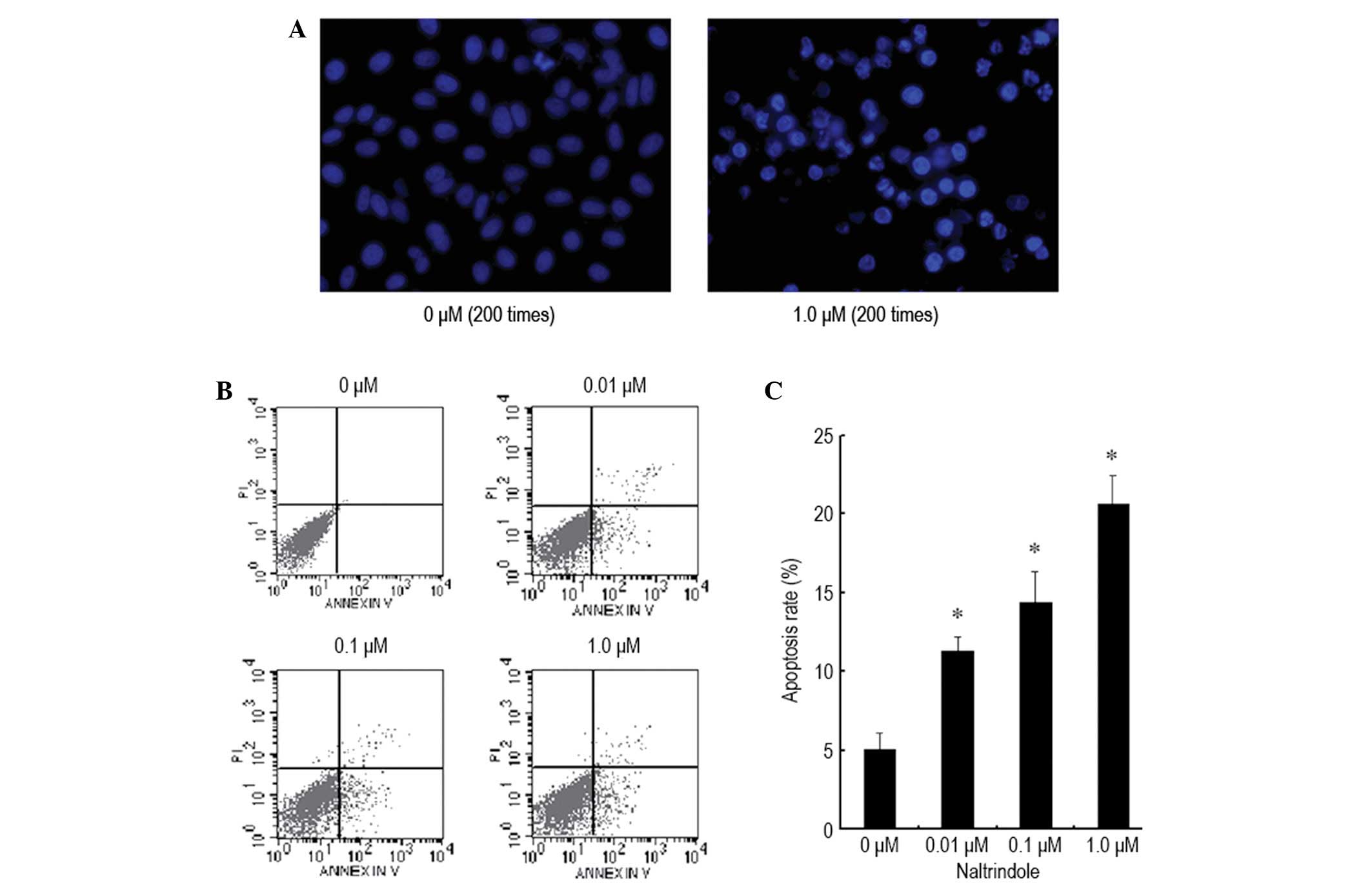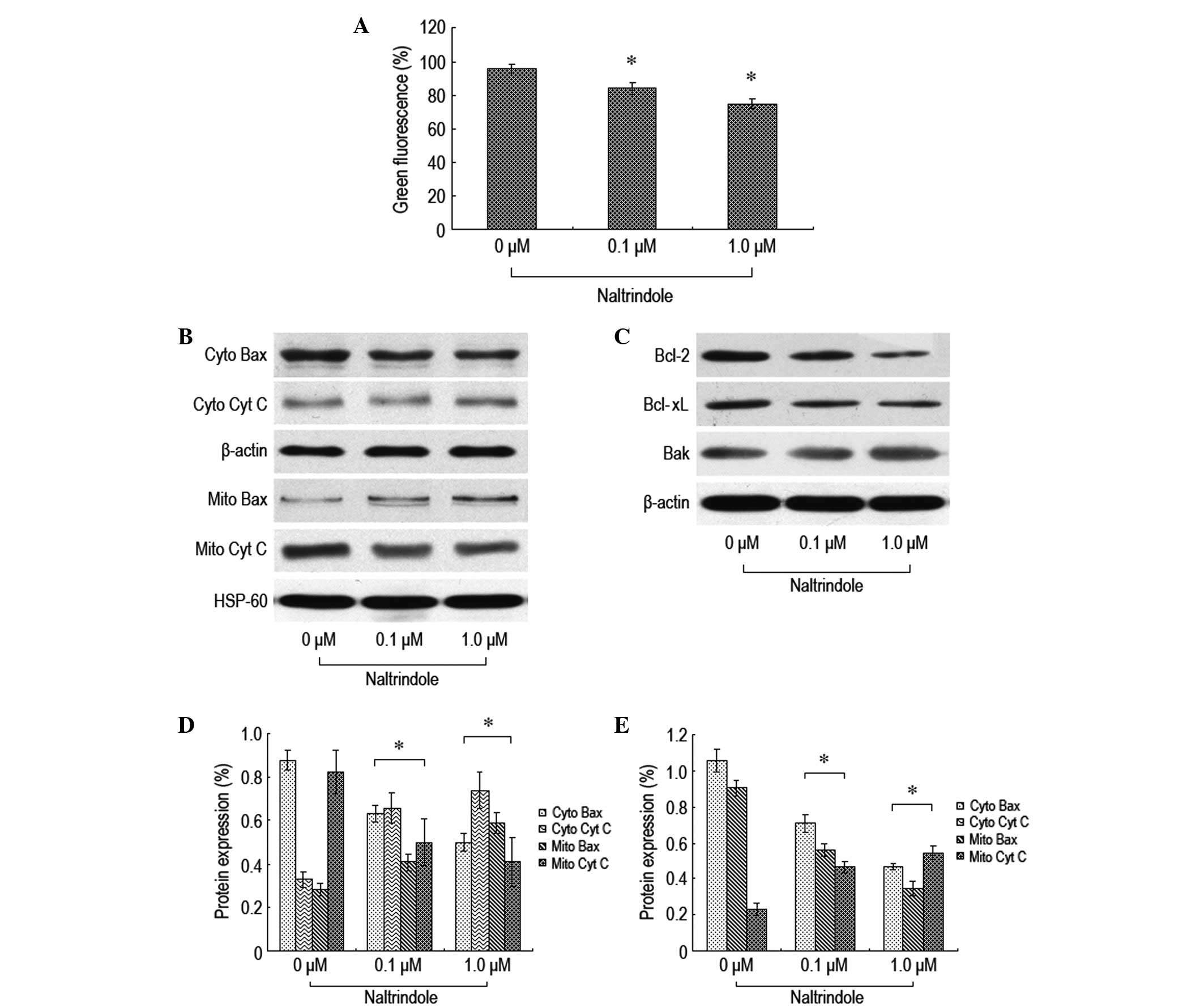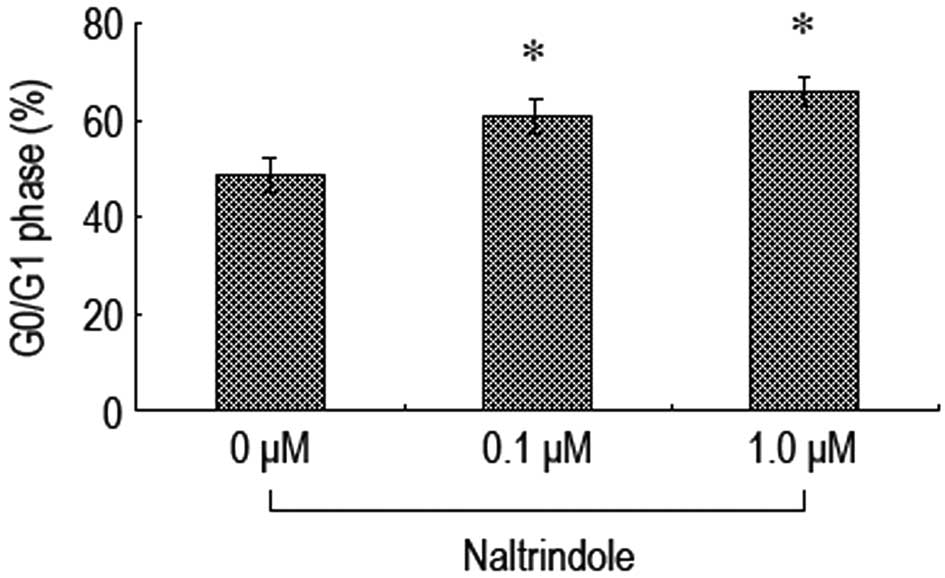|
1
|
Ricard D, Idbaih A, Ducray F, Lahutte M,
Hoang-Xuan K and Delattre JY: Primary brain tumours in adults.
Lancet. 379:1984–1996. 2012. View Article : Google Scholar : PubMed/NCBI
|
|
2
|
Johannesen TB, Langmark F and Lote K:
Cause of death and long-term survival in patients with
neuro-epithelial brain tumours: a population-based study. Eur J
Cancer. 39:2355–2363. 2003. View Article : Google Scholar : PubMed/NCBI
|
|
3
|
Zhang Y, Chao T, Li R, Liu W, Chen Y, Yan
X, Gong Y, Yin B, Liu W, Qiang B, Zhao J, Yuan J and Peng X:
MicroRNA-128 inhibits glioma cells proliferation by targeting
transcription factor E2F3a. J Mol Med (Berl). 87:43–51. 2009.
View Article : Google Scholar : PubMed/NCBI
|
|
4
|
Komotar RJ, Otten ML, Moise G and Connolly
ES Jr: Radiotherapy plus concomitant and adjuvant temozolomide for
glioblastoma-a critical review. Clin Med Oncol. 2:421–422.
2008.PubMed/NCBI
|
|
5
|
Stupp R, Mason WP, van den Bent MJ, Weller
M, Fisher B, Taphoorn MJ, Belanger K, Brandes AA, Marosi C, Bogdahn
U, Curschmann J, Janzer RC, Ludwin SK, Gorlia T, Allgeier A,
Lacombe D, Cairncross JG, Eisenhauer E and Mirimanoff RO; European
Organisation for Research and Treatment of Cancer Brain Tumor and
Radiotherapy Groups; National Cancer Institute of Canada Clinical
Trials Group. Radiotherapy plus concomitant and adjuvant
temozolomide for glioblastoma. N Engl J Med. 352:987–996. 2005.
View Article : Google Scholar : PubMed/NCBI
|
|
6
|
Notas G, Kampa M, Nifli AP, Xidakis K,
Papasava D, Thermos K, Kouroumalis E and Castanas E: The inhibitory
effect of opioids on HepG2 cells is mediated via interaction with
somatostatin receptors. Eur J Pharmacol. 555:1–7. 2007. View Article : Google Scholar : PubMed/NCBI
|
|
7
|
Tang B, Li Y, Yuan S, Tomlinson S and He
S: Upregulation of the δ opioid receptor in liver cancer promotes
liver cancer progression both in vitro and in vivo. Int J Oncol.
July 31–2013.(Epub ahead of print).
|
|
8
|
Marzioni M, Invernizzi P, Candelaresi C,
Maggioni M, Saccomanno S, Selmi C, Rychlicki C, Agostinelli L,
Cassani B, Miozzo M, Pasini S, Fava G, Alpini G and Benedetti A:
Human cholangiocarcinoma development is associated with
dysregulation of opioidergic modulation of cholangiocyte growth.
Dig Liver Dis. 41:523–533. 2009. View Article : Google Scholar : PubMed/NCBI
|
|
9
|
Heiss A, Ammer H and Eisinger DA:
delta-Opioid receptor-stimulated Akt signaling in neuroblastoma x
glioma (NG108-15) hybrid cells involves receptor tyrosine
kinase-mediated PI3K activation. Exp Cell Res. 315:2115–2125. 2009.
View Article : Google Scholar
|
|
10
|
Madar I, Bencherif B, Lever J, Heitmiller
RF, Yang SC, Brock M, Brahmer J, Ravert H, Dannals R and Frost JJ:
Imaging delta- and mu-opioid receptors by PET in lung carcinoma
patients. J Nucl Med. 48:207–213. 2007.PubMed/NCBI
|
|
11
|
Debruyne D, Leroy A, DE Wever O, Vakaet L,
Mareel M and Bracke M: Direct effects of delta opioid receptor
agonists on invasion-associated activities of HCT-8/E11 colon
cancer cells. Anticancer Res. 30:9–17. 2010.PubMed/NCBI
|
|
12
|
Zhong J, Kong X, Zhang H, Yu C, Xu Y, Kang
J, Yu H, Yi H, Yang X and Sun L: Inhibition of CLIC4 enhances
autophagy and triggers mitochondrial and ER stress-induced
apoptosis in human glioma U251 cells under starvation. PLoS One.
7:e393782012. View Article : Google Scholar
|
|
13
|
Ordys BB, Launay S, Deighton RF, McCulloch
J and Whittle IR: The role of mitochondria in glioma
pathophysiology. Mol Neurobiol. 42:64–75. 2010. View Article : Google Scholar : PubMed/NCBI
|
|
14
|
Zhou J, Cheng G, Cheng G, Tang HF and
Zhang X: Novaeguinoside II inhibits cell proliferation and induces
apoptosis of human brain glioblastoma U87MG cells through the
mitochondrial pathway. Brain Res. 1372:22–28. 2011. View Article : Google Scholar : PubMed/NCBI
|
|
15
|
Zhang ZF, Guo Y, Zhang JB and Wei XH:
Induction of apoptosis by chelerythrine chloride through
mitochondrial pathway and Bcl-2 family proteins in human hepatoma
SMMC-7721 cell. Arch Pharm Res. 34:791–800. 2011. View Article : Google Scholar : PubMed/NCBI
|
|
16
|
Du J, Tang B, Wang J, Sui H, Jin X, Wang L
and Wang Z: Antiproliferative effect of alpinetin in BxPC-3
pancreatic cancer cells. Int J Mol Med. 29:607–612. 2012.PubMed/NCBI
|
|
17
|
Tang B, Zhang Y, Liang R, Yuan P, Du J,
Wang H and Wang L: Activation of the δ-opioid receptor inhibits
serum deprivation-induced apoptosis of human liver cells via the
activation of PKC and the mitochondrial pathway. Int J Mol Med.
28:1077–1085. 2011.
|
|
18
|
Kerr JF, Wyllie AH and Currie AR:
Apoptosis: a basic biological phenomenon with wide-ranging
implications in tissue kinetics. Br J Cancer. 26:239–257. 1972.
View Article : Google Scholar : PubMed/NCBI
|
|
19
|
Chiarugi P and Giannoni E: Anoikis: a
necessary death program for anchorage-dependent cells. Biochem
Pharmacol. 76:1352–1364. 2008. View Article : Google Scholar : PubMed/NCBI
|
|
20
|
Ng CF, Ng PK, Lui VW, Li J, Chan JY, Fung
KP, Ng YK, Lai PB and Tsui SK: FHL2 exhibits anti-proliferative and
anti-apoptotic activities in liver cancer cells. Cancer Lett.
304:97–106. 2011. View Article : Google Scholar : PubMed/NCBI
|
|
21
|
Yang TY, Chang GC, Chen KC, Hung HW, Hsu
KH, Sheu GT and Hsu SL: Sustained activation of ERK and
Cdk2/cyclin-A signaling pathway by pemetrexed leading to S-phase
arrest and apoptosis in human non-small cell lung cancer A549
cells. Eur J Pharmacol. 663:17–26. 2011. View Article : Google Scholar : PubMed/NCBI
|
|
22
|
Hatzoglou A, Kampa M and Castanas E:
Opioid-somatostatin interactions in regulating cancer cell growth.
Front Biosci. 10:244–256. 2005. View
Article : Google Scholar : PubMed/NCBI
|
|
23
|
Kampa M, Bakogeorgou E, Hatzoglou A,
Damianaki A, Martin PM and Castanas E: Opioid alkaloids and
casomorphin peptides decrease the proliferation of prostatic cancer
cell lines (LNCaP, PC3 and DU145) through a partial interaction
with opioid receptors. Eur J Pharmacol. 335:255–265. 1997.
View Article : Google Scholar
|
|
24
|
Baldelli B, Vecchio L, Biggiogera M,
Vittoria E, Muzzonigro G, Gazzanelli G and Malatesta M:
Ultrastructural and immunocytochemical analyses of opioid treatment
effects on PC3 prostatic cancer cells. Microsc Res Tech.
64:243–249. 2004. View Article : Google Scholar : PubMed/NCBI
|
|
25
|
Kerros C, Cavey T, Sola B, Jauzac P and
Allouche S: Somatostatin and opioid receptors do not regulate
proliferation or apoptosis of the human multiple myeloma U266
cells. J Exp Clin Cancer Res. 28:772009. View Article : Google Scholar : PubMed/NCBI
|
|
26
|
Tang B, Du J, Gao ZM, Liang R, Sun DG, Jin
XL and Wang LM: DADLE suppresses the proliferation of human liver
cancer HepG2 cells by activation of PKC pathway and elevates the
sensitivity to cis-diammine dichloridoplatium. Zhonghua Zhong Liu
Za Zhi. 34:425–429. 2012.(In Chinese).
|
|
27
|
von Haefen C, Wendt J, Semini G, Sifringer
M, Belka C, Radetzki S, Reutter W, Daniel PT and Danker K:
Synthetic glycosidated phospholipids induce apoptosis through
activation of FADD, caspase-8 and the mitochondrial death pathway.
Apoptosis. 16:636–651. 2011.PubMed/NCBI
|
|
28
|
Burlacu A: Regulation of apoptosis by
Bcl-2 family proteins. J Cell Mol Med. 7:249–257. 2003. View Article : Google Scholar : PubMed/NCBI
|
|
29
|
Mattson MP and Kroemer G: Mitochondria in
cell death: novel targets for neuroprotection and cardioprotection.
Trends Mol Med. 9:196–205. 2003. View Article : Google Scholar : PubMed/NCBI
|
|
30
|
Saito M, Korsmeyer SJ and Schlesinger PH:
BAX-dependent transport of cytochrome c reconstituted in pure
liposomes. Nat Cell Biol. 2:553–555. 2000. View Article : Google Scholar : PubMed/NCBI
|
|
31
|
Nicholson DW, Ali A, Thornberry NA,
Vaillancourt JP, Ding CK, Gallant M, Gareau Y, Griffin PR, Labelle
M and Lazebnik YA: Identification and inhibition of the ICE/CED-3
protease necessary for mammalian apoptosis. Nature. 376:37–43.
1995. View
Article : Google Scholar : PubMed/NCBI
|
|
32
|
Riedl SJ and Shi Y: Molecular mechanisms
of caspase regulation during apoptosis. Nat Rev Mol Cell Biol.
5:897–907. 2004. View
Article : Google Scholar : PubMed/NCBI
|
|
33
|
Capiati DA, Vazquez G, Tellez Iñón MT and
Boland RL: Antisense oligonucleotides targeted against protein
kinase c alpha inhibit proliferation of cultured avian myoblasts.
Cell Prolif. 33:307–315. 2000. View Article : Google Scholar
|
|
34
|
Ali AS, Ali S, El-Rayes BF, Philip PA and
Sarkar FH: Exploitation of protein kinase C: a useful target for
cancer therapy. Cancer Treat Rev. 35:1–8. 2009. View Article : Google Scholar : PubMed/NCBI
|
|
35
|
Colombo D, Tringali C, Franchini L,
Cirillo F and Venerando B: Glycoglycerolipid analogues inhibit PKC
translocation to the plasma membrane and downstream signaling
pathways in PMA-treated fibroblasts and human glioblastoma cells,
U87MG. Eur J Med Chem. 46:1827–1834. 2011. View Article : Google Scholar
|




















